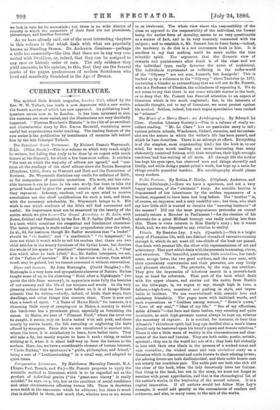Comparative Literature. By Hutcheson Macaulay Posnett, M.A. (Began Paul, Trench,
and Co.)—Mr. Posnett proposes to apply the scientific method to literature, which is to be regarded not as the product of individual genius (" the 'great-man theory' is really suicidal," he says, on p. 84), but as the resultant of social conditions and, other circumstances affecting human life. There is doubtless some truth in the arguments which he adduces ; but there is much that is doubtful in them, and much that, whether true or no, seems to us irrelevant. The whole view about the responsibility of the class as opposed to the responsibility of the individual, the former being the earlier form of morality, seems to us very questionable as a matter of fact, and to be very remotely connected with the subject ; and to establish it, Mr. Posnett has to force faate,—indeed, the tendency to do this is a not uncommon fault in him. It is needless to say that nothing could be more unlike the true scientific spirit. The argument that the Homeric view of rewards and punishments after death is of the class and not the individual type, really deserves the name of sophistical. The individuals represented as suffering in the under-world of the "Odyssey" are not men, forsooth, but demigods ! This is backed up by a reference to the " Odyssey " about Tantalus (p. 137), containing a blunder so extraordinary that we will not do Mr. Posnett, who is a Professor of Classics, the unkindness of repeating it. We do not mean to say that there is not some valuable matter in the book, or to deny that Mr. Posnett has directed attention to an aspect of literature which is too much neglected ; but, in the interests of scientific thought, not to say of literature, we must protest against his method. Seldom, indeed, has such vague speculation been ranked as " science."


































 Previous page
Previous page